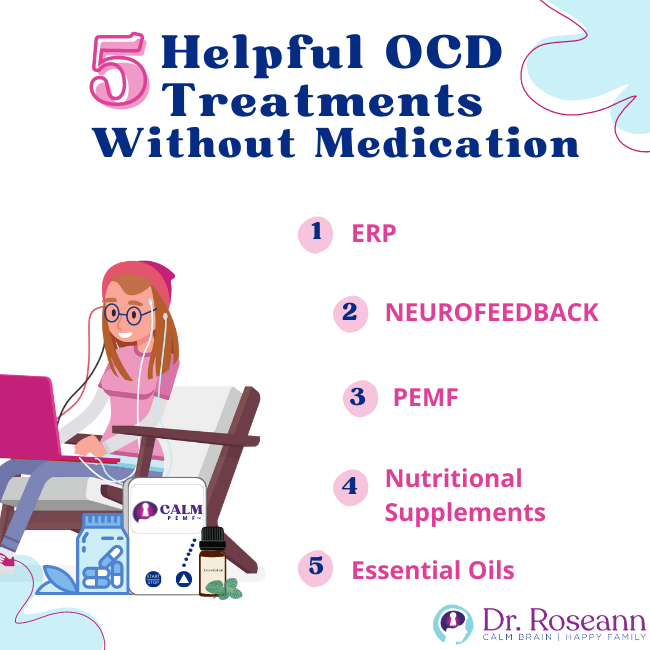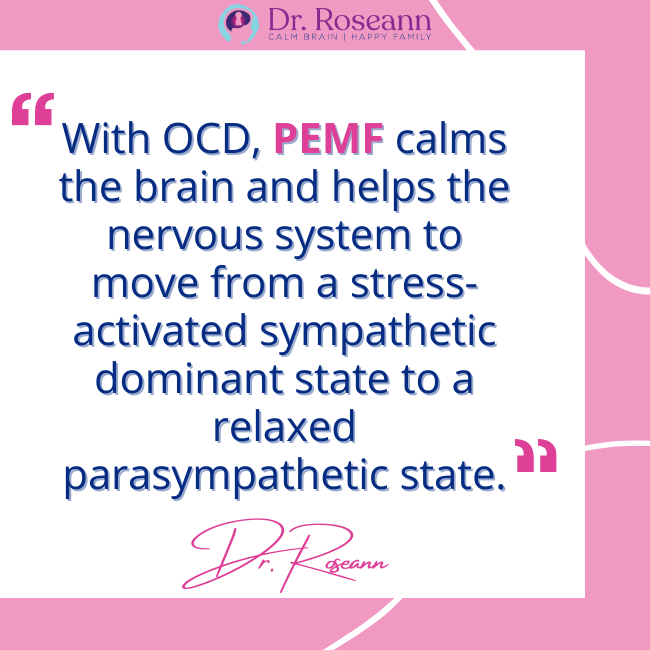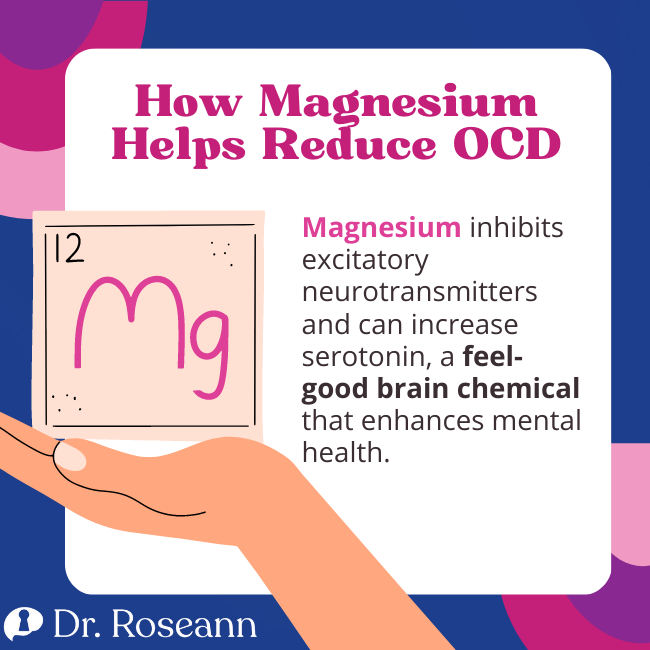It can be difficult and frustrating to find out why your child has OCD. In fact, if it comes with a sudden onset due to infection or toxins, it leaves parents overwhelmed or even frightened of what's happening to their children. Some parents even wonder if their child has gone crazy when they see them developing obsessions and compulsions out of nowhere.

It isn't easy to learn about the toxins and infections in the brain and their connection to the child's behavior while trying to help your child manage their obsessive-compulsive behaviors.
On the other hand, for children who develop OCD over time, the challenge is in finding its root cause and a provider who can help. Many parents go from provider to provider who incorrectly uses anxiety therapies instead of properly treating OCD. It can sadly take years before a child or teen and their family are given the right methods to take control of the OCD.
There are so many myths about OCD that also create hurdles for parents to even understand that their child has OCD and not anxiety or another clinical condition.
Parents should realize that they need to calm their child's OCD-hijacked brain. When a brain is in a fear state, overcoming OCD is almost impossible. They must look for solutions that safely calm the brain so that OCD psychotherapy can work.
To support parents in their quest for natural solutions that are backed by scientific evidence, here is a list of the treatment options that can be used. All these different treatments don't involve the use of OCD medication that could affect their child's brain development, here are some natural yet effective treatments for OCD.
#1 ERP
Exposure and Response Prevention therapy (ERP) is a first-line treatment for OCD. Cognitive behavioral therapy can work with OCD but only when combined with exposure therapy where kids are given opportunities to safely explore their obsessions and compulsions.
Exposure therapy sessions require the parent's involvement in helping their child break their OCD cycle at home. It's a method that teaches the child how to cope with their intrusive thoughts, compulsions, and anxiety instead of reinforcing them.
Through ERP, parents are educated on how to respond to their child's obsessions and compulsions. They are taught exactly what to say or do when they see their child's OCD behaviors triggered. ERP is a type of talk therapy combined with behavioral exposure therapy where parents gain more confidence in helping their children get through their distress.
The process of ERP OCD therapy may make parents uncomfortable initially and it is hard to talk back to the OCD monster but it is always worth it because it works in a way that is hard to describe.
I recall working with Noah whose OCD was so bad that he couldn't go to school because he couldn't get in a moving vehicle. His brain was in an extremely hijacked state, so we did neurofeedback and PEMF first to calm his brain before we could even attempt ERP.
After getting a bit of relief his parents were too scared to do therapy and his obsessions quickly increased soon after stopping neurofeedback. Noah and his parents then decided to do the ERP and over time he was able to say goodbye to his OCD.
#2 Neurofeedback
Neurofeedback is used to calm the brain and the nervous system and then move an OCD child to a relaxed, parasympathetic state. In such a state, the child with OCD starts to think differently and take positive action.
If the child's nervous system is stressed and hyper-activated, an OCD child won't be able to think, pay attention, and take action to stop their OCD behavior. Rather, their stress-hijacked brains get stuck in loops of obsessive thoughts and repetitive behaviors.
Neurofeedback therapy sessions for severe OCD get so powerful because it calms the central nervous system at a subconscious level so the child won't be in a constantly activated state. When paired with coaching and psychotherapy, children learn new and effective ways to manage their unwanted thoughts and persistent fears.
If the nervous system is calm, the child will be able to respond to stimuli in a more healthy way. It means fewer obsessions and compulsions, irritated and angry behaviors, and persistent and distressing thoughts. The child will exhibit calm thinking and engaged behaviors while having the ability to think and act without getting stuck.
Based on the research done by Prichep et. al, 1993 on QEEG Brain Map data, it becomes easier to see which regions of the OCD brain are over-stimulated or under-activated. However, OCD can also cause under-stimulation in the brain when due associated with other clinical conditions like PANS/PANDAS and autoimmune encephalopathy.
#3 PEMF
Pulsed Electromagnetic Field refers to electromagnetic pulses that can stimulate the nerve cells for healthier functions, activity, and communication. A PEMF device can alter the bio-electromagnetic field of certain organs in the body to enhance its cellular functioning.
Low-frequency PEMFs pass through the body and penetrate the cells, tissues, organs, and bones without being altered or absorbed. As they pass through, they stimulate electrical and chemical processes in the tissues.
Using PEMF therapy benefits cellular energy, thereby improving cellular health and function. Through PEMF therapy, the body can effectively process electrical and chemical exchanges and address imbalances or dysfunctions, leading to natural healing and improved adaptation.

With OCD, PEMF calms the brain and helps the nervous system move from a stress-activated sympathetic dominant state to a relaxed parasympathetic state. When the brain is calmer, then a person with OCD can do the work in therapy to break those brain habits that lead to obsessive thinking, compulsions, and rituals.
#4 Nutritional Supplements
There are different supplements that can help alleviate the symptoms of OCD in children and teens. If you don't want to use prescription medications on your child, then you may give the following natural supplements in addition to healthy food. These are great complementary to the methods of treatment mentioned above.
A well-rounded treatment approach to OCD may include ocd supplements known to support neurological health. Vitamins for OCD, such as Vitamin B12 and Vitamin E, play a role in maintaining nervous system balance and are considered some of the best supplements for OCD. The regimen might also include natural supplements for OCD that have been traditionally used to support mental well-being.
Magnesium

Magnesium inhibits excitatory neurotransmitters and can increase serotonin, a feel-good brain chemical that enhances mental health. In OCD, the brain gets stuck in an intrusive thought loop due to too many excitatory neurotransmitters. By calming down those excitatory neurotransmitters, a child or teen with OCD can better use the tools they learn in Exposure and Response Prevention (ERP).
N-Acetylcysteine (NAC)
NAC helps the body synthesize glutathione, an important antioxidant necessary for liver detoxification It protects the body from different toxins by binding and inactivating environmental pollutants, microbes, herbicides, toxic heavy metals like mercury, lead, and cadmium, and drugs like acetaminophen. Too much toxin in the body triggers the brain's inflammatory response and may cause different mental health issues like OCD.
The occurrence of OCD is influenced by excessive neurotransmitter activities and inflammation. NAC is a good supplement for OCD kids as it inhibits excitatory neurotransmitters release and reduces inflammation.
Glycine
Glycine, as a naturally occurring amino acid, supports neurotransmitter and nerve functions. It assists in the production of cellular energy, supports detoxification, and promotes brain and intestinal health.
While the body can produce small amounts of glycine, it is best acquired through food and supplement intake. High concentrations of glycine can be found in high-protein meat, gelatin, collagen, and bone broth.
Glycine also supports a lot of cognitive, metabolic, and muscle functions. It keeps the gut healthy, which is essential for brain health. It works by inhibiting oxidative stress that interferes with intestinal health.
Milk Thistle
Milk thistle helps children and teens with OCD patients by promoting detoxification for improved mental health. Toxins building up in the body or brain or body may cause the psychiatric symptoms associated with OCD.
Milk Thistle helps increase the serotonin level of those with OCD. Research shows that Milk Thistle may help lower obsessions and compulsions in as fast as four weeks (Karcı & Celik, 2020).
L-Theanine
L-Theanine is another helpful amino acid for children and teens suffering from OCD. Found in green tea, L-Theanine helps ease depression and anxiety symptoms due to its relaxing and calming properties. L-Theanine also supports healthy brainwave activities and neurocognitive functioning by calming the brain.
L-Theanine works against anxiety disorders by increasing GABA. But unlike prescription medicines, it doesn't induce sleepiness or impair a child's motor skills. It also blocks glutamate, an excitatory neurotransmitter. Inhibiting glutamate means preventing the brain from getting overstimulated. When the brain is calm, the onset of the symptoms of a mental health disorder like OCD is prevented (Lardner, 2013).
Inositol
Inositol, also called Vitamin B8, helps promote relaxation, restful sleep, and brain wellness. It helps reduce depression, anxiety, obsessions, and compulsions. One research studied the effect of inositol on OCD patients. Results show that their Yale-Brown Obsessive Compulsive Scale scores got significantly lower scores when taking inositol (Fux et al., 1996). It can help with intrusive thoughts and compulsions.
#5 Essential Oils
The use of essential oils is also recommended for children and teens with OCD. The use of these oils, along with some lifestyle interventions and relaxation techniques, may help your child greatly. Some of the most helpful oils that can alleviate OCD symptoms are:
Frankincense
Frankincense oil was used in an animal-based study and results show that it can initiate a significant reduction in the patient's corticosterone levels when administered in diluted and undiluted forms. It may also be combined with jojoba oil to further reduce stress (Okano et al., 2019).
Rosemary
Neuropharmacological investigations have shown that rosemary has anti-spasmodic, anti-inflammatory, and analgesic properties. It also helps prevent anxiety while boosting memory functions. Its essential oil is one of the most promising natural remedies to treat the pathological conditions of the nervous system, such as anxiety, depression, epilepsy, Alzheimer's disease, and Parkinson's disease among others (Rahbardar & Hosseinzadeh, 2020).
Ylang Ylang
Ylang-ylang oil can help decrease pulse rate and blood pressure while increasing alertness and attentiveness after either transdermal absorption or inhalation (Setzer, 2009). As a floral essential oil, it has been shown to create a comforting and soothing effect on children and kids with OCD or other neurological disorders.
While it is not yet certain what the exact cause of OCD is, taking the first step to finding the right treatment programs for your child is essential to set them in the right direction. The use of natural, science-backed solutions to treatment-resistant OCD doesn't just give you that sense of safety against the severe side effects of OCD medications but will also help in improving your child's quality of life.
Lifestyle and Nutritional Strategies: A Comprehensive Approach for OCD and Anxiety Management
Targeted Nutritional Interventions
For those seeking supplement for OCD, it’s important to consider the impact of each nutrient. Research into vitamins for intrusive thoughts, such as Omega-3 fatty acids and their role in brain health, could offer insight into natural strategies that help manage these challenging symptoms. Identifying the best vitamins for OCD is an individualized process, with a focus on comprehensive dietary analysis and tailored supplement plans.
Best Supplement Practices for Symptom Management
Determining the best supplement for ocd requires a nuanced understanding of each individual's unique biochemistry and symptom profile. OCD natural supplements, chosen with care, can be a valuable part of a holistic treatment plan. Supplements to help ocd should be used in conjunction with other evidence-based practices, under the guidance of a healthcare professional.
Synergy of Nutrition and Lifestyle
In addition to ocd supplements natural, a balanced lifestyle that includes stress management techniques and regular physical activity is critical. A synergistic approach that combines these elements can lead to improved outcomes for those managing OCD symptoms.
By ensuring all these aspects are considered and integrated into a comprehensive management plan, individuals living with OCD and anxiety can work towards improving their overall quality of life. It is always recommended to consult with a healthcare provider before starting any new supplement or treatment regimen.
Cultivating Hope and Resilience
While the search for a miracle cure for OCD continues, cultivating hope and resilience is essential. Testimonials and case studies of those who say ‘how I cured my ocd' or ‘how to beat ocd' can be inspiring, providing insight into the many paths to wellness, whether through dietary changes, the use of herbal remedies for anxiety, or comprehensive treatments for OCD.
Citations
Fux, M., Levine, J., Aviv, A., & Belmaker, R. H. (1996). Inositol treatment of obsessive-compulsive disorder. American Journal of Psychiatry, 153(9), 1219–1221. https://doi.org/10.1176/ajp.153.9.1219
Karcı, C. K., & Celik, G. G. (2020). Nutritional and herbal supplements in the treatment of obsessive compulsive disorder. General Psychiatry, 33(2), e100159. https://doi.org/10.1136/gpsych-2019-100159
Lardner, A. L. (2013). Neurobiological effects of the green tea constituent theanine and its potential role in the treatment of psychiatric and neurodegenerative disorders. Nutritional Neuroscience, 17(4), 145–155. https://doi.org/10.1179/1476830513y.0000000079
Okano, S., Honda, Y., Kodama, T., & Kimura, M. (2019). The Effects of Frankincense Essential Oil on Stress in Rats. Journal of Oleo Science, 68(10), 1003–1009. https://doi.org/10.5650/jos.ess19114
Prichep, L. S., Mas, F., Hollander, E., Liebowitz, M., John, E. R., Almas, M., DeCaria, C. M., & Levine, R. H. (1993). Quantitative electroencephalographic subtyping of obsessive-compulsive disorder. Psychiatry Research: Neuroimaging, 50(1), 25–32. https://doi.org/10.1016/0925-4927(93)90021-9
Rahbardar, M., & Hosseinzadeh, H. (2020). Therapeutic effects of rosemary (Rosmarinus officinalis L.) and its active constituents on nervous system disorders. Iran J Basic Med Sci, 23(9). https://doi.org/10.22038/ijbms.2020.45269.10541
Setzer, W. N. (2009). Essential Oils and Anxiolytic Aromatherapy. Natural Product Communications, 4(9), 1934578X0900400. https://doi.org/10.1177/1934578×0900400928
Dr. Roseann Capanna-Hodge is a mental health expert who is frequently called up to give her expert opinion in the media:
- Insider – What is OCD?
- What to Expect: Why Does My Toddler Keep Pulling Her Own Hair?
- Parade: Olympic Boxer Ginny Fulchs Has OCD—Here's Why That Term Is More Complex Than Many People Think
- Single Care Controlling the uncontrollable: Living with OCD during a pandemic
- MomsCove How to Help a Child with Anxiety and OCD
Always remember… “Calm Brain, Happy Family™”
Are you looking for SOLUTIONS for your struggling child or teen?
Dr. Roseann and her team are all about solutions, so you are in the right place!
There are 3 ways to work with Dr. Roseann:
You can get her books for parents and professionals, including: It’s Gonna Be OK™: Proven Ways to Improve Your Child’s Mental Health, Teletherapy Toolkit™ and Brain Under Attack: A Resource For Parents and Caregivers of Children With PANS, PANDAS, and Autoimmune Encephalopathy.
If you are a business or organization that needs proactive guidance to support employee mental health or an organization looking for a brand representative, check out Dr. Roseann’s media page and professional speaking page to see how we can work together.
Dr. Roseann is a Children’s Mental Health Expert and Licensed Therapist who has been featured in/on hundreds of media outlets including The Mel Robbins Show, CBS, NBC, PIX11 NYC, Today, FORBES, CNN, The New York Times, The Washington Post, Business Insider, Women’s Day, Healthline, CNET, Parade Magazine and PARENTS. FORBES called her, “A thought leader in children’s mental health.”

She coined the terms, “Re-entry panic syndrome” and “eco-anxiety” and is a frequent contributor to media on mental health.
Dr. Roseann Capanna-Hodge has three decades of experience in working with children, teens and their families with attention-deficit hyperactivity disorder (ADHD), autism, concussion, dyslexia and learning disability, anxiety, Obsessive Compulsive Disorder (OCD), depression and mood disorder, Lyme Disease, and PANS/PANDAS using science-backed natural mental health solutions such as supplements, magnesium, nutrition, QEEG Brain maps, neurofeedback, PEMF, psychotherapy and other non-medication approaches.
She is the author of three bestselling books, It’s Gonna Be OK!: Proven Ways to Improve Your Child's Mental Health, The Teletherapy Toolkit, and Brain Under Attack. Dr. Roseann is known for offering a message of hope through science-endorsed methods that promote a calm brain.
Her trademarked BrainBehaviorResetⓇ Program and It’s Gonna be OK!Ⓡ Podcast has been a cornerstone for thousands of parents facing mental health, behavioral or neurodevelopmental challenges.
She is the founder and director of The Global Institute of Children’s Mental Health, Neurotastic™Brain Formulas and Dr. Roseann Capanna-Hodge, LLC. Dr. Roseann is a Board Certified Neurofeedback (BCN) Practitioner, a Board Member of the Northeast Region Biofeedback Society (NRBS), Certified Integrative Mental Health Professional (CIMHP) and an Amen Clinic Certified Brain Health Coach. She is also a member of The International Lyme Disease and Associated Disease Society (ILADS), The American Psychological Association (APA), Anxiety and Depression Association of America (ADAA) National Association of School Psychologists (NASP), International OCD Foundation (IOCDF).
© Roseann-Capanna-Hodge, LLC 2023
Disclaimer: This article is not intended to give health advice and it is recommended to consult with a physician before beginning any new wellness regime. *The effectiveness of diagnosis and treatment vary by patient and condition. Dr. Roseann Capanna-Hodge, LLC does not guarantee certain results.













